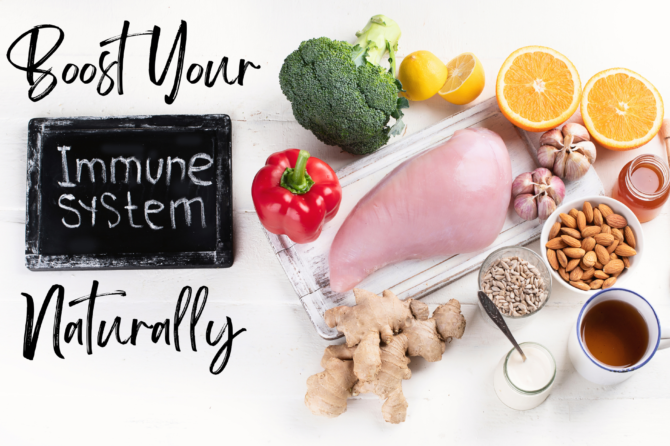
Boosting Immunity Naturally: Proven Tips That Actually Work

Introduction: Strengthen Your Body’s Natural Defense System
In today’s fast-paced world, maintaining a strong immune system is more important than ever. Your immune system acts as your body’s first line of defense against harmful pathogens, helping you stay healthy and ward off illnesses. But how can you naturally enhance your immunity without relying on medications or supplements?
This comprehensive guide will explore effective and science-backed ways to boost immunity naturally. Whether you’re a health enthusiast looking to optimize your well-being or someone who wants to prevent seasonal illnesses, these strategies will help fortify your immune defenses.
Understanding the Immune System

What Is the Immune System?
Your immune system is a complex network of cells, tissues, and organs designed to protect your body from harmful invaders like bacteria, viruses, and toxins. Think of it as your body’s security system, always on alert to fight off threats.
Key Components of the Immune System:
White Blood Cells (Leukocytes) – Detect and destroy harmful organisms.
Antibodies – Help recognize and neutralize foreign substances.
Lymph Nodes – Act as filters for harmful pathogens.
Spleen – Helps fight infections and removes damaged blood cells.
Bone Marrow – Produces immune cells like white blood cells.
Thymus – Trains and develops T-cells for immune response.
Nutrition: The Foundation of a Strong Immune System

A well-balanced diet is essential for maintaining optimal immune function. Here are key nutrients and foods that can help boost your immunity:
Vitamin C-Rich Foods
Vitamin C is well-known for enhancing immune response by supporting white blood cell production.
Citrus fruits (oranges, lemons, grapefruits)
Berries (strawberries, blueberries, raspberries)
Kiwi
Bell peppers
Broccoli
Brussels sprouts
Zinc-Packed Foods
Zinc plays a crucial role in immune cell development and function.
Oysters
Beef
Pumpkin seeds
Lentils
Chickpeas
Yogurt
Probiotics for Gut Health
A large portion of your immune system resides in your gut. Consuming probiotic-rich foods can help maintain a healthy gut microbiome.
Yogurt
Kefir
Sauerkraut
Kimchi
Kombucha
Miso
Exercise and Its Role in Immune Function

Regular physical activity enhances immune function by improving circulation, reducing stress, and promoting overall well-being.
Best Exercises for Immune Support
Moderate-intensity aerobic exercise (brisk walking, cycling, swimming)
High-Intensity Interval Training (HIIT) (short bursts of intense exercise)
Strength training (weight lifting, resistance exercises)
Yoga and Tai Chi (combine physical movement with stress reduction)
Tip: Over-exercising can suppress immune function. Aim for balanced, moderate exercise to optimize immune health.
The Importance of Quality Sleep

Lack of sleep weakens your immune system, making you more susceptible to infections. During sleep, your body releases cytokines—proteins that regulate immune response.
Tips for Better Sleep
Maintain a consistent sleep schedule.
Create a relaxing bedtime routine.
Keep your bedroom cool, dark, and quiet.
Limit screen time before bed.
Avoid caffeine and alcohol late in the day.
Stress Management: Protect Your Immune System

Chronic stress increases cortisol levels, which can weaken immune function. Implementing stress-relieving techniques can help keep your immune system strong.
Effective Stress-Reduction Techniques
Meditation & mindfulness
Deep breathing exercises
Regular physical activity
Spending time outdoors
Engaging in hobbies
Building strong social connections
Hydration and Immunity

Proper hydration is often overlooked but is vital for immune health. Water helps transport nutrients, remove toxins, and support lymphatic function.
Tips for Staying Hydrated
Drink at least 8 glasses of water daily.
Consume water-rich foods like fruits and vegetables.
Limit caffeine and alcohol intake.
Use a reusable water bottle to track intake.
Natural Herbs and Supplements for Immune Support

While a balanced diet should be your primary source of nutrients, certain herbs and supplements can enhance immune function.
Top Immune-Boosting Herbs & Supplements
Echinacea – May help reduce cold symptoms.
Elderberry – Has antiviral properties and supports immune function.
Garlic – Contains allicin, known for antibacterial effects.
Ginger – Anti-inflammatory and antioxidant benefits.
Turmeric – Contains curcumin, which has strong immune-boosting properties.
Note: Always consult a healthcare provider before adding new supplements to your routine.
Lifestyle Habits That Strengthen Immunity
Maintain Good Hygiene
Wash hands frequently with soap and water.
Avoid touching your face (mouth, nose, eyes).
Disinfect frequently touched surfaces.
Limit Alcohol & Quit Smoking
Excessive alcohol intake weakens the immune system.
Smoking damages lung health and reduces immune response.
Spend Time Outdoors
Sunlight boosts Vitamin D production, crucial for immune function.
Maintain a Healthy Weight
A balanced diet and regular exercise support immune health and overall well-being.
FAQs on Boosting Immunity Naturally
Q1: What are the best natural ways to boost immunity? A: Eating a nutrient-rich diet, exercising regularly, getting quality sleep, managing stress, and staying hydrated.
Q2: Can certain foods improve immune function? A: Yes! Foods rich in vitamin C, D, zinc, and probiotics support immunity.
Q3: How much sleep is necessary for a strong immune system? A: Most adults need 7-9 hours of quality sleep per night.
Q4: Does exercise help strengthen immunity? A: Yes! Moderate physical activity enhances immune response and overall health.
Q5: Are supplements necessary for immune support? A: Not always, but they can be beneficial if you have specific deficiencies.
Q6: Can stress weaken the immune system? A: Yes, chronic stress suppresses immune function. Managing stress through relaxation techniques is key.
Q7: How does hydration affect immunity? A: Water helps transport nutrients, flush toxins, and support immune cell function.
Conclusion: Embrace a Holistic Approach to Immune Health
Boosting your immune system naturally is not about quick fixes but adopting a consistent, holistic approach to wellness. By focusing on proper nutrition, exercise, sleep, stress management, and healthy lifestyle choices, you can create an environment where your immune system thrives.
Remember, every individual is different. Listen to your body, make gradual changes, and consult a healthcare professional if needed. By incorporating these natural immune-boosting strategies, you’re investing in long-term health and vitality. Here’s to a stronger, healthier you!






